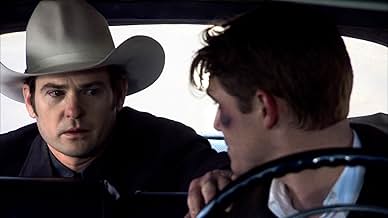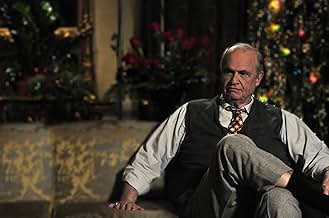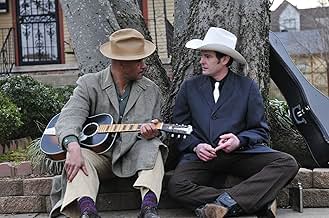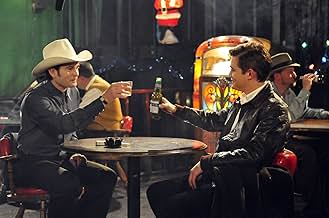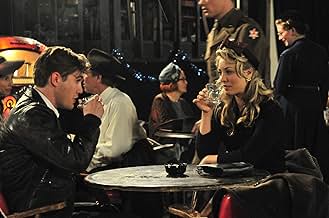Ende 1952, die besten Jahre in Hank Williams' Karriere liegen hinter ihm, heuert er ein einheimisches Kind an, das ihn durch die Appalachen für zwei Neujahrsshows in West Virginia und Ohio f... Alles lesenEnde 1952, die besten Jahre in Hank Williams' Karriere liegen hinter ihm, heuert er ein einheimisches Kind an, das ihn durch die Appalachen für zwei Neujahrsshows in West Virginia und Ohio fährt.Ende 1952, die besten Jahre in Hank Williams' Karriere liegen hinter ihm, heuert er ein einheimisches Kind an, das ihn durch die Appalachen für zwei Neujahrsshows in West Virginia und Ohio fährt.
Fred Thompson
- O'Keefe
- (as Fred Dalton Thompson)
Mark Whitman Johnson
- Trooper
- (as Mark W. Johnson)
Matt Lindahl
- Store Singer
- (as Matthew Lindahl)
Handlung
WUSSTEST DU SCHON:
- WissenswertesOn December 30, 1952, Hank Williams hired Charles Carr, a freshman at Auburn, to drive him in his 1952 powder-blue Cadillac from Montgomery, Alabama to shows in Charleston, West Virginia and Canton, Ohio. Snow fell most of the way. The afternoon of December 31, Williams learned that snow had canceled his flight to Charleston. They checked into a Knoxville hotel. The hotel porters had to carry Williams, under the influence of two shots of morphine, to the backseat of the limo when it was decided that they would drive to Canton. The next morning, in Oak Hill, West Virginia, Carr found Williams dead, lying in the same position in which the porters had placed him. Carr remained in Montgomery and worked in investment and real estate until he retired. He died in July 2013, at age 79.
- PatzerAfter agreeing to hire him, Stan tells Silas: "Be at this address Monday at 8:00." When Silas picks up Mr. Wells, "December 30, 1952" is on the screen. December 30, 1952 was actually a Tuesday.
Ausgewählte Rezension
Hank Williams is the one I cite as my favorite singer, period. I was exposed to the man's beautifully written, elegantly sung music several years ago, mostly from my grandfather - a connoisseur of classic country - and haven't stopped listening since. His songs possess a uniformed honesty and emotional resonance that is greatly lacking in every genre of music today, regardless of what you're a fan of. His music hits the warmest notes along with the coldest notes, turning every song-topic into a ballady, poetic work of incomparable and, for the time, subversive art. He is a singer that, in my opinion, contributed more to a genre in sixteen years than some artists do in a lifetime in the industry.
It would seem that with TimeLife releasing many of Hank Williams' previously unreleased music and interviews and a film even being made on the man that Williams fans are still willing to pay hard-earned money for his work even though he has been dead for decades. I was always sort of mean-spirited to the thought that Johnny Cash could get a brilliantly-made biopic with A-list actors and accolades-galore but the real pioneer, Williams, couldn't so much as get an hour-long TV special about his impact and legacy on a genre.
Well, now he at least has something; a film that details the infamous cross-country trip he took with an ill-prepared soul who wasn't even in store for the mental-strain and time-crunch it would take to get the singer to his shows in the briskest of weather, let alone his death in the backseat of the Cadillac they were driving in. Harry Thomason's The Last Ride proudly boasts its subject as "music's original bad boy" but gives him a film about as tame as a house-cat. This is a tired, by-the-numbers biopic that does little to emphasize the true beauty of Williams' as an artist and makes the young twenty-nine year old seem nothing more than a bitter codger whose achievements and accomplishments as nothing but accidental and a footnote in the creation of a huge, cultural genre.
The plot: Silas (Jesse James), a young mechanic, is given the job as Hank Williams' (referred to as either "Luke" from his pen-name "Luke the Drifter" or "Mr. Wells," as directed by his old driver) driver in the late December month so that he can make his shows in West Virginia and Ohio, respectively. He is implored to prevent Williams, er, Wells from drinking and getting too rowdy, but this man, myth, and legend won't listen to some backwoods hillbilly who don't know nothing' about sorrow and woe. They set off in a bright blue Cadillac and attempt something of a mutual understanding.
Williams is portrayed by Henry Thomas, who looks like 25% Hank Williams and 75% Brad Paisley. It's no bother, though, as he shows his competence for low-key material and humble dialog. However, writers Howard Klausner and Dub Cornett gives Thomas not much of a character. They somehow managed to turn Hank Williams, the godfather of country music and outlaw-isms, into a psychotic, shallow lunatic with a small giddiness for adventure and a caricature to house deep-rooted drug and alcohol problems.
This is one of the strangest biopics in recent memory. It focuses on a huge man in one of his worst times with no indication or backstory on how he exactly got to the lows he is currently in, predicates itself off of an event that is interesting for a certain period of time before it becomes redundant, features a soundtrack of country songs not performed by the original artists, and bears only four songs even written by its subject that aren't even performed by him. The Johnny Cash biopic Walk the Line at least found an actor who could sing Cash and sing him soulfully and majestically. The Hank Williams biopic barely even lets the subject's name be uttered at an audible level. What kind of loyalty and respect is that when you make a film about a singer but won't go as far as to let the audience hear one song by the man, let the actor portraying him to sing one song by the man, or even let his name be spoken? The southland is seen in a crisp, highly pictorial light, but it's all too much like a postcard, with little depth or interest in what made Williams truly embrace the culture and the atmosphere of it. The south and its norms played a significant part in Williams' songs and so did the topics of love and loss. Such themes are wholly absent here. I iterate the point that if the film began as a traditional biography, from the beginning to end of its subject life, it would be far more stable and less frazzled. Despite focusing on a specific point in the life of Williams, it still feels thin and unexploited.
The fact that it at least has a potency in its southern visuals and solid direction is all well and good, but to what reward? A bigger Hank Williams fan than me I see soul-crushed and deeply hurt at the wasted opportunity here. A person looking simply for a biopic and a lesson on an extremely important musical and cultural figure will likely be letdown because of the film's lack of humanization or narrative depth. The Last Ride clocks in as one of the most disappointing films of the year. No matter how it struggles and strives, it never got out of its dullness alive.
Starring: Henry Thomas, Jesse James, and Fred Dalton Thompson. Directed by: Henry Thomason.
It would seem that with TimeLife releasing many of Hank Williams' previously unreleased music and interviews and a film even being made on the man that Williams fans are still willing to pay hard-earned money for his work even though he has been dead for decades. I was always sort of mean-spirited to the thought that Johnny Cash could get a brilliantly-made biopic with A-list actors and accolades-galore but the real pioneer, Williams, couldn't so much as get an hour-long TV special about his impact and legacy on a genre.
Well, now he at least has something; a film that details the infamous cross-country trip he took with an ill-prepared soul who wasn't even in store for the mental-strain and time-crunch it would take to get the singer to his shows in the briskest of weather, let alone his death in the backseat of the Cadillac they were driving in. Harry Thomason's The Last Ride proudly boasts its subject as "music's original bad boy" but gives him a film about as tame as a house-cat. This is a tired, by-the-numbers biopic that does little to emphasize the true beauty of Williams' as an artist and makes the young twenty-nine year old seem nothing more than a bitter codger whose achievements and accomplishments as nothing but accidental and a footnote in the creation of a huge, cultural genre.
The plot: Silas (Jesse James), a young mechanic, is given the job as Hank Williams' (referred to as either "Luke" from his pen-name "Luke the Drifter" or "Mr. Wells," as directed by his old driver) driver in the late December month so that he can make his shows in West Virginia and Ohio, respectively. He is implored to prevent Williams, er, Wells from drinking and getting too rowdy, but this man, myth, and legend won't listen to some backwoods hillbilly who don't know nothing' about sorrow and woe. They set off in a bright blue Cadillac and attempt something of a mutual understanding.
Williams is portrayed by Henry Thomas, who looks like 25% Hank Williams and 75% Brad Paisley. It's no bother, though, as he shows his competence for low-key material and humble dialog. However, writers Howard Klausner and Dub Cornett gives Thomas not much of a character. They somehow managed to turn Hank Williams, the godfather of country music and outlaw-isms, into a psychotic, shallow lunatic with a small giddiness for adventure and a caricature to house deep-rooted drug and alcohol problems.
This is one of the strangest biopics in recent memory. It focuses on a huge man in one of his worst times with no indication or backstory on how he exactly got to the lows he is currently in, predicates itself off of an event that is interesting for a certain period of time before it becomes redundant, features a soundtrack of country songs not performed by the original artists, and bears only four songs even written by its subject that aren't even performed by him. The Johnny Cash biopic Walk the Line at least found an actor who could sing Cash and sing him soulfully and majestically. The Hank Williams biopic barely even lets the subject's name be uttered at an audible level. What kind of loyalty and respect is that when you make a film about a singer but won't go as far as to let the audience hear one song by the man, let the actor portraying him to sing one song by the man, or even let his name be spoken? The southland is seen in a crisp, highly pictorial light, but it's all too much like a postcard, with little depth or interest in what made Williams truly embrace the culture and the atmosphere of it. The south and its norms played a significant part in Williams' songs and so did the topics of love and loss. Such themes are wholly absent here. I iterate the point that if the film began as a traditional biography, from the beginning to end of its subject life, it would be far more stable and less frazzled. Despite focusing on a specific point in the life of Williams, it still feels thin and unexploited.
The fact that it at least has a potency in its southern visuals and solid direction is all well and good, but to what reward? A bigger Hank Williams fan than me I see soul-crushed and deeply hurt at the wasted opportunity here. A person looking simply for a biopic and a lesson on an extremely important musical and cultural figure will likely be letdown because of the film's lack of humanization or narrative depth. The Last Ride clocks in as one of the most disappointing films of the year. No matter how it struggles and strives, it never got out of its dullness alive.
Starring: Henry Thomas, Jesse James, and Fred Dalton Thompson. Directed by: Henry Thomason.
- StevePulaski
- 31. Mai 2013
- Permalink
Top-Auswahl
Melde dich zum Bewerten an und greife auf die Watchlist für personalisierte Empfehlungen zu.
- How long is The Last Ride?Powered by Alexa
Details
- Erscheinungsdatum
- Herkunftsland
- Offizielle Standorte
- Sprache
- Auch bekannt als
- Последняя поездка
- Drehorte
- Sherwood, Arkansas, USA(Roundtop Filling Station where Silas meets the female attendant who he asks for a date)
- Produktionsfirmen
- Weitere beteiligte Unternehmen bei IMDbPro anzeigen
Box Office
- Budget
- 9.000.000 $ (geschätzt)
- Bruttoertrag in den USA und Kanada
- 27.000 $
- Eröffnungswochenende in den USA und in Kanada
- 16.270 $
- 23. Okt. 2011
- Weltweiter Bruttoertrag
- 27.000 $
- Laufzeit1 Stunde 42 Minuten
- Farbe
Zu dieser Seite beitragen
Bearbeitung vorschlagen oder fehlenden Inhalt hinzufügen







